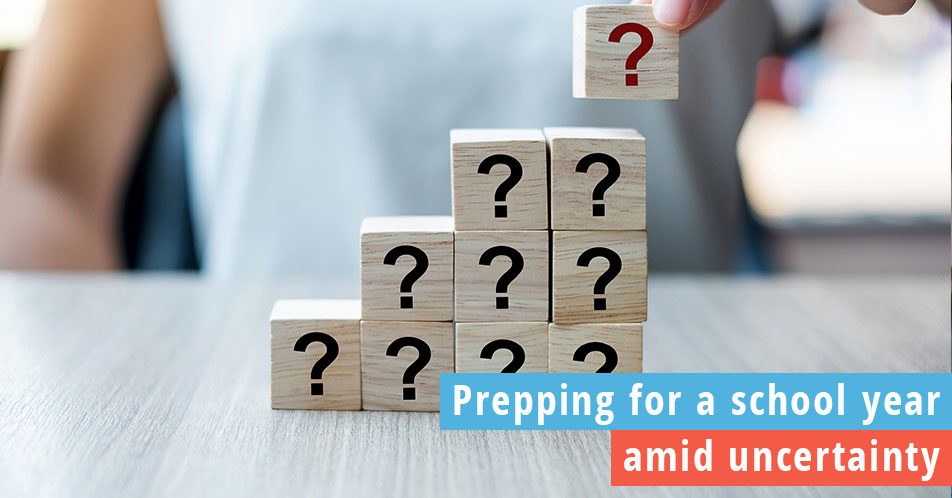Hosts Carole Dorn-Bell and Joel Gagne explain four focus areas to consider while planning for a school year amid uncertainty
Carole Dorn-Bell and Joel Gagne focus this week’s podcast episode about prepping for a school year amid uncertainty during the COVID-19 pandemic.
Administrators start planning for the next school year in January and February. Many schools have just ended the 2019-2020 school year, and administrators aren’t sure what the next school year might look like.
Now that everyone is wrapping up with graduations and the drive-through graduation ceremonies, administrators are turning toward the next school year and wondering how they can prep.
Joel and Carole cover four focus areas as administrators prepare for the next school year.
“The reality is, that for the most part I don’t think anybody expects school buses to pick up kids and empty them out into a school full of 600 kids and classes of 28:1,” Carole says. “It’s just not happening.”
Carole says that schools are preparing for a few different scenarios. One is a hybrid approach where students are in school for some of the time and they do the rest online. Another option is all online, or another option is that schools operate and then are shut down for a periodic basis.
“First of all we have a little bit of acknowledgement for the school administrators who are brave enough to listen to this podcast here in mid-May, and their heads are exploding right now,” Joel says. “They are exhausted, they’re tired, their world has been turned upside down, and even the thought of planning for next year seems just so far away when the last couple of months seem like years.”
Joel and Carole agree that administrators deserve some much-needed time off, but unfortunately the future is coming whether we like it or not. And now is the time to prepare for different scenarios.
Joel says that the biggest thing right now is the words that no one wants to hear: We don’t know.
“Everything is still hour-by-hour, minute-by-minute, and it’s all data-driven, and the data keeps coming in every second,” Joel says. “School districts don’t know yet.”
School administrators should communicate in a way with their communities that assures stakeholders, but it’s also important to admit that there’s a lot of uncertainty surrounding the next school year.
“We are planning on having a school year, we’re just not entirely sure what that is going to come out to be,” Joel says.
As preparing for different scenarios is number one, the second focus area is to communicate expectations.
“The conversations I’ve had of late with my superintendents are things like, ‘How do I transport kids to school safely and what are the guidelines for that?’” Carole says. She says one avenue that districts can take is to conduct surveys to ask students and community members what schools can do to make people feel safe.
Joel emphasizes that multiple avenues of communications are crucial. Successfully setting community expectations means that school districts must overcommunicate and meet community members where they are. He says it’s important to be strategic in communications, which brings Carole to her third point: plan your communications.
Carole says it’s important to be strategic and carefully plan out and sketch what your communications will look like. She says for Allerton Hill’s clients, this year’s communications plan looks a bit different, though, than previous years’ communications plans.
Carole says she recently recommended to a communications director to not build out the summer and fall communications plan too far in advance. She says rather than building out a plan month-by-month, instead she recommends building out a plan with stages.
“Have data gathering as one stage where you’re collecting feedback,” Carole says. She says after data gathering, schools should have a design phase, and then a rollout phase.
Carole and Joel emphasize that school districts need to be nimble at times like this.
Finally, Carole explains that it’s important to have the financial conversation with your community. She says that as finances get tighter, some districts are cutting their communication budgets.
“It’s really stunning to me that at a time when communication is needed more than ever, that communication would be what’s decimated,” Carole says. “It’s really like putting Duct tape over your mouth and not informing anybody.”
Joel says now is that time for school districts to tell their stories, to overcommunicate, and to keep the community support in place by explaining the whole picture.
If you have questions about your communications plan, reach out to the AHC team. We’re happy to help bring method to communications madness amid uncertainty.
If you have any topics you’d like to hear or have any questions for our team, please reach out via info@weloveschoolspodcast.com.



